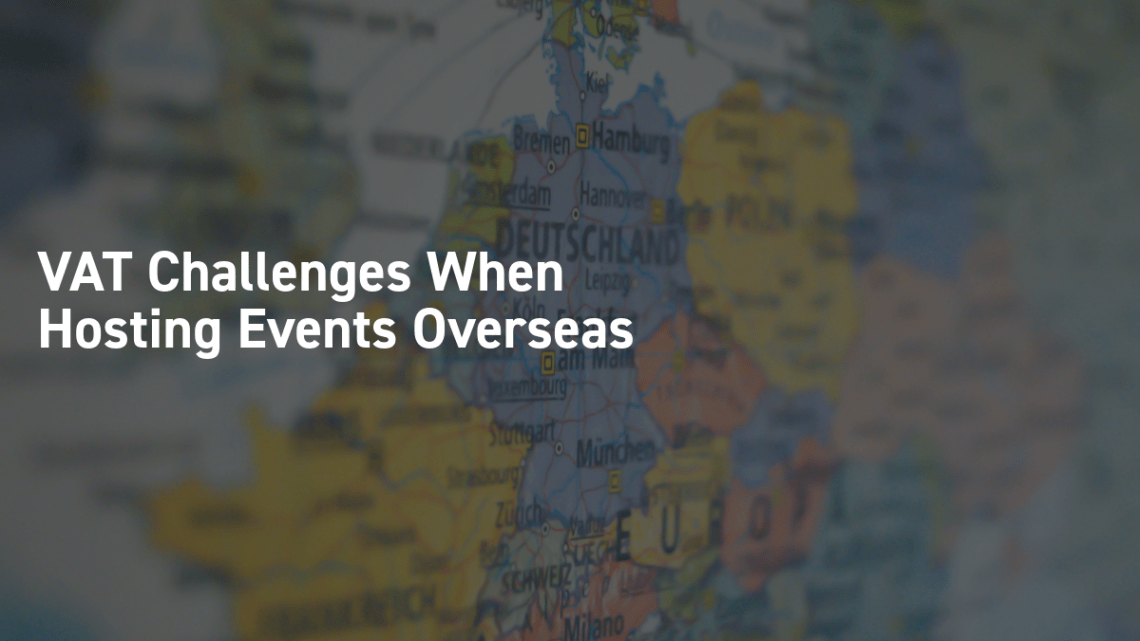
Following our previous article on hosting events in the UK, this piece explores the additional complexities UK businesses face when taking their events overseas. From varying VAT rates across jurisdictions to mandatory registration requirements, hosting international events presents unique challenges that require careful planning and expert guidance.
Understanding EU VAT Variations
While the EU VAT Directive provides a foundation for uniformity across member states, each EU country maintains autonomy in implementing these rules into national law. This creates significant disparities that event organisers must navigate carefully, as each country’s VAT rules should be assessed independently to ensure correct treatment.
The differences become immediately apparent when examining VAT rates. Across EU countries, standard VAT rates range from 17% to 27%, with most countries also offering reduced rates for specific types of events. For example, admission to a congress or exhibition may attract a different VAT rate compared to a sporting event or cultural show, and these variations must be reviewed on a country-by-country basis.
Event Admission Complexities
For event admissions, B2C sales will consistently be subject to VAT in the country where the event takes place. However, B2B admissions present more complex considerations. While these sales are also subject to VAT in the host country, the critical question is whether the supplier must charge the VAT directly.
Several EU countries, including France, Italy, and the Netherlands, have implemented reverse charge mechanisms for B2B admission ticket sales, whereby the customer accounts for the VAT on their purchase. However, these reverse charge systems come with their own intricacies and local requirements. Some implementations require the purchasing business to be established in the event’s host country, while others merely require VAT registration.
Failure to apply the correct VAT treatment can result in VAT being incorrectly charged, frustrating customers, or not charged at all. This latter scenario often requires additional payment requests to customers or forces the supplier to absorb the cost if customers are uncooperative, ultimately reducing profit margins as the VAT remains due to the tax authority regardless.
Exhibition Space and Stand Rental Variations
The treatment of exhibition space and stand rental supplies varies significantly across jurisdictions. Some EU countries treat all exhibition space supplies as general rule supplies, regardless of whether related services are included, similar to the UK’s approach for stand space with related services. Other countries mirror the UK’s split VAT treatment or determine applicable VAT treatment based on the number of related services provided.
These variations, combined with the fact that some event-related supplies are reportable on the VAT return in the host country while others are reportable where the supplier is established, make it essential to determine the correct reporting approach for each supply.
Registration Requirements and Thresholds
A significant consideration for UK companies is that no EU country offers a VAT registration threshold for non-established event hosts. This means a UK company hosting an event in Germany and selling admission tickets faces mandatory German VAT registration, regardless of turnover levels.
For events outside the EU (excluding the UK), the landscape varies. Some countries maintain local registration thresholds that must be breached before mandatory VAT registration applies, though voluntary registration may sometimes be requested. Additionally, certain non-EU countries have opted to tax only supplies made to local residents, meaning overseas attendees’ admission tickets may not be subject to local VAT.
Double Taxation Risks
Hosting events outside the EU can create particular complexities, including potential double taxation scenarios. For instance, a UK-established host selling sponsorship to a UK business customer faces UK VAT from a UK perspective. However, the host country may have local VAT rules stating the same supply is subject to local VAT because the service is consumed in that jurisdiction.
This results in VAT being due at prevailing rates in both countries on a single transaction, often creating irrecoverable VAT for business customers who may not be VAT registered in the host country, while reducing margins for the event organiser.
Digital Compliance Requirements
The increasing digitalisation across the EU presents another challenge for UK event organisers. While the UK lags behind in e-invoicing implementation, many EU countries have already enacted or scheduled e-invoicing and e-reporting mandates.
These mandates often require non-resident companies to comply when VAT registering as non-resident entities, even for one-off events. Compliance typically requires bespoke software implementation, creating both financial costs and time pressures that must be factored into event planning.
Multi-Country Events
When events span multiple countries, such as a charity bike ride from London to Paris, VAT implications in each jurisdiction must be considered independently. Qualification for exemption in one country doesn’t guarantee similar treatment in others. This may require VAT registration and apportionment to determine how much VAT charged on participation fees is due to each tax authority, unless one jurisdiction allows for exemption.
How HW Fisher Can Assist
These complexities highlight why seeking expert VAT advice before opening any revenue streams is essential when hosting international events. VAT treatment varies depending on whether sales are B2B or B2C, and whether customers are established in the host’s country, event country, or a third country.
HW Fisher can provide bespoke advice to map your revenue streams, ensuring correct VAT treatment for all supplies while ensuring VAT invoices comply with local requirements. We assist in determining recoverable VAT on expenses and can guide you through local intricacies, including registration thresholds, customer-specific charging requirements, and VAT exemption applications.
Our ongoing VAT compliance services include local VAT registration and filing ongoing VAT declarations, which may be required monthly, bi-monthly, quarterly, bi-annually, or annually depending on the jurisdiction and projected event turnover.
Early consultation with VAT experts can prevent compliance issues, optimise VAT recovery opportunities, and ensure your international events achieve their full profit potential while meeting all regulatory requirements.
We’d love to hear from you. To book an appointment or to find out more about our services: